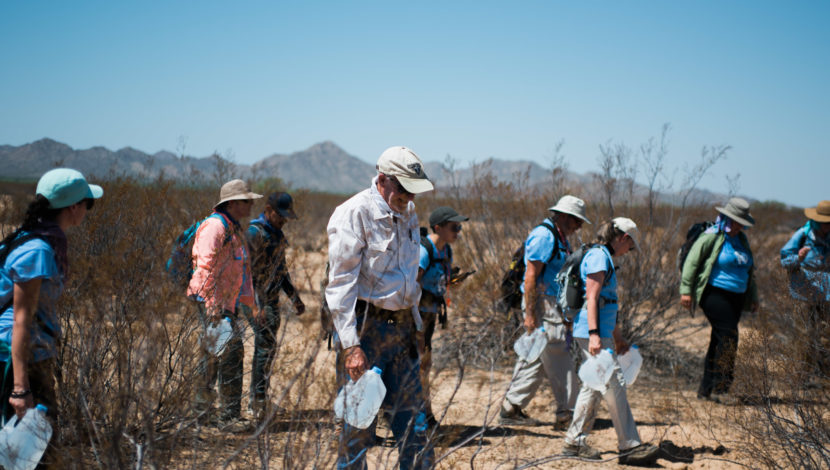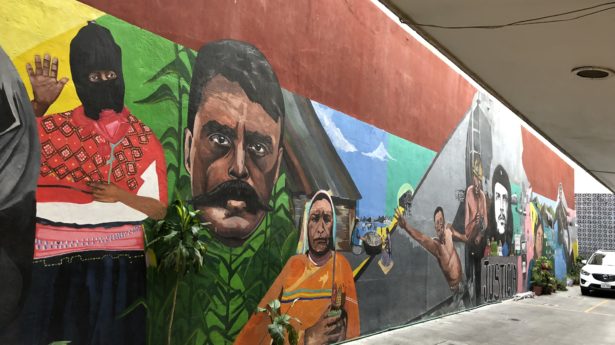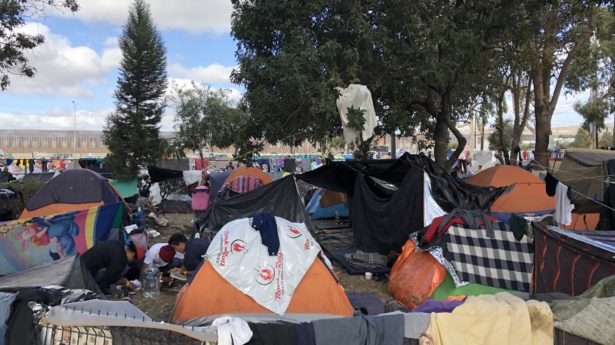The Unitarian Universalist Service Committee advances human rights through grassroots collaborations.
Celebrating Our Partners’ Human Rights Impacts in 2018

By on December 19, 2018
UUSC’s impact is the result of cooperative action around the globe to dismantle systems of oppression. To achieve this impact, we center the voices and experiences of those most impacted by the human rights abuses we work to prevent, and partner with and seek to strengthen grassroots groups and movements organizing themselves to advance our shared human rights goals.
This past year, nearly every week brought new, often unprecedented rights violations and additional burdens on vulnerable communities. And yet, time and again, our fearless partners helped affected communities assert their rights, challenge oppressive systems, and make significant human rights impacts in UUSC’s core focus areas: migrant justice in the U.S. and Central America, climate justice in the U.S. and the Pacific, and humanitarian crisis response and recovery in the U.S., Burma, and Haiti.
Migrant Justice
Ending the Criminalization of Immigrant Rights Activists
No More Deaths (Arizona)
Organized more than 60 faith leaders from across the United States to provide much-needed water for migrants and to protest the criminalization of humanitarian aid.
In August, No More Deaths (NMD) coordinated an interfaith contingent of faith leaders to leave more than 120 gallons of water in a remote area of the Sonoran desert where the remains of many people who have attempted to cross into the United States have been found. In January of 2017, on the very same day that NMD released a report (supported by UUSC) documenting U.S. Border Patrol’s interference with humanitarian aid, Border Patrol agents arrested NMD volunteer Scott Warren. Scott has been arraigned on two counts of felony harboring and one count of felony conspiracy, and if convicted he could face up to 20 years in prison. In addition, Scott and eight other NMD volunteers are facing federal misdemeanor charges for their humanitarian aid work in the West Desert outside Ajo, Arizona. In response to these charges, working in coalition with Ajo Samaritans and in close coordination with UUSC and the Unitarian Universalist Association, NMD facilitated an action where more than 60 faith leaders traveled to the West Desert and participated in the work NMD does every day – getting water and food into regions of the desert that people are walking through daily. Widely reported, the action was a powerful statement against the criminalization of humanitarian aid.
Protecting the Right to Safety of Immigrants, Refugees, and Asylum-Seekers in the exodus
FM4 Paso Libre (Mexico), Scalabrinianas Misión con Migrantes y Refugiados (Mexico), and Activate Labs (California)
UUSC’s partners provided accompaniment, know your rights information, shelter, and art-based psychosocial support for families in response to “the exodus” of asylum-seekers heading to the United States from Central America.
FM4 Paso Libre provided clothes, emergency supplies, and coordinated volunteers to support many of the migrants and asylum-seekers that reached Guadalajara, Mexico, as part of the exodus. FM4 is part of a network of 23 shelters around the country that share information and strategize to try and reduce the dangers of the migrants’ journey and ensure that they are armed with accurate information about their options. UUSC’s justice education team at the College of Social Justice is also coordinating the recruitment, screening, and placement of longer-term, skilled volunteers at FM4’s shelter.
Scalabrinianas, Mission with Migrants and Refugees (SMR) promoted coordinated efforts with various sectors of Mexican civil society to ensure that migrants in the exodus received food, shelter, clothing, medical attention, and legal advice along their route. SMR has been pressuring the Mexican federal and state governments to take responsibility for the humanitarian emergency and disseminating information to counteract xenophobia. SMR has organized efforts aimed at embassies, Mexican authorities, and the United Nations High Commissioner for Refugees in order to initiate proceedings for people seeking refuge in Mexico and other countries. The SMR team also helped coordinate shelter along the route, physically accompanied the parts of the exodus that remained behind the main group to ensure their safety, and is now providing holistic accompaniment to people who have requested asylum in Mexico.
As part of its “Bridges to Belonging” (“Puentes Para la Pertenencia”) program, Activate Labs brought art-based actions and trauma workshops to families in the exodus and in detention at the border. They sourced local art supplies, canvasses, and created large graphic banners for parents and children to fill with color, tell their stories, and “bring people back to themselves.” On December 18, International Migrants Day, Activate Labs will bring these banners to Washington, D.C., and present them to legislators.
Resisting the Criminalization of Immigrants
Georgia Latino Alliance for Human Rights (Georgia)
Increased the safety and protected the human rights of immigrants by reducing the cooperation of local police with federal authorities.
The Georgia Latino Alliance for Human Rights (GLAHR) continued to make significant strides in local organizing and advocacy despite operating in a hostile political environment. As the Georgia gubernatorial campaign descended into racist demagoguery – one candidate made campaign stops in what he called his “deportation bus” and another promised to use his pickup truck to “round up criminal illegals” – GLAHR quietly worked to increase safety and protect the human rights of immigrants in Georgia, winning the adoption this year of two “welcoming policies” in Decatur and Cobb County, which will reduce the cooperation of local police with federal authorities.
Climate Justice
Tuvalu Association of NGOs (Tuvalu)
Organized Tuvalu’s first gathering of major stakeholders to collaborate on solutions to climate-forced displacement and assert their right to stay.
In June, the Tuvalu Association of NGOs (TANGO) organized a two-day workshop on the Pacific Island of Tuvalu to facilitate discussions and raise awareness of the effects of the climate crisis and climate-forced displacement (CFD). This was the first public forum on CFD in Tuvalu, and included government officials, local leaders, civil society, diplomatic missions, faith-based institutions, and other major stakeholders. In a document summarizing the outcomes of the workshop, the group emphasized that migration from ancestral lands and territories will not take place without exploring all possible alternatives for climate change adaptation. This document will be disseminated to other civil society organizations around the country to inform local, regional, and international advocacy.
Tulele Peisa Inc. (Papua New Guinea)
Organized and trained the next generation of climate change warriors.
Communities on the Carteret Islands of Papua New Guinea are among the first people on earth having to relocate because of the climate crisis. There, Tulele Peisa Inc. (TPI), is seeking to preserve local culture as it leads the community’s migration to higher ground. The highlight of TPI’s work this year was its “Schools Climate Change Road Show,” which resulted in the selection of 30 “Student Climate Change Warriors,” whom TPI will train in climate change awareness. In its Student Climate Change Warriors, TPI sees a group of young leaders poised to make a difference in how their government confronts the impacts of the climate crisis.
Lowlander Center (Louisiana)
Trained young adult leaders to be advocates for addressing impacts of climate change.
In the bayous of southern Louisiana, UUSC’s 2017 Innovation Fellow, the Lowlander Center, trained 12 new Native leaders from five Tribes to be advocates for addressing the impacts of the climate crisis. These new leaders had an immediate impact. One trainee, new to speaking publicly on his own, traveled to Alaska to address the Alaska Sea Grant staff on climate impacts. Four trainees, all young adults, spent two weeks in Hawaii with M. Kalani Souza, a Native Hawaiian storyteller, poet, and peacemaker, to learn how to put the stories of their Tribes into social media and broadcasting. As Lowlander put it, “The older generation is reinvigorated by seeing the youth with self-esteem and courage to take on the impacts of climate. There is so much hope and joy expressed in their pursuit to do what is right knowing full well the immediate and long-term impacts [of climate change] are already shaping their futures.”
Crisis Response
Mouvman Peyizan Papay (Haiti)
Improved well-being in the EcoVillages and increased the sustainability of the EcoVillage School.
Using an emergency grant from UUSC, Mouvman Peyizan Papay (MPP), UUSC’s long-time partner in Haiti’s Central Plateau, was able to connect all six EcoVillages to the electrical grid (none of the 60 houses or community spaces previously had access to electricity) and to fix two broken wells there. Now, all villagers now have access to clean water and electricity, improving well-being in the villages and leading to new ambitions among the villagers. In addition, the EcoVillage School was recently granted a certificate of nationalization from the Haitian Ministry of Education, and the school is now known as “The National School of the EcoVillages of Colladere!” This means that, if and when the state has the funds, all teachers will be compensated by the Ministry, making the school viable for the long-term.
Fe y Justicia Worker Center (Texas)
Organized and trained second-responders and launched a workers empowerment clinic, helping build the workers’ rights infrastructure in Houston after Hurricane Harvey.
As part of UUSC’s Hurricane Harvey response, Fe y Justicia Worker Center raised occupational health and safety awareness among so-called second responders (day laborers, domestic workers, and other workers and volunteers doing cleanup and reconstruction work after the hurricane) and successfully launched a workers’ empowerment clinic. As of November, the clinic had processed nearly 700 claims, including hundreds of violations constituting nearly $1 million in stolen wages. Fe y Justicia is collaborating with local law schools to bring fair labor cases on behalf of their clients, as part of an effort to build the worker rights infrastructure in Houston. Marianela Acuña Arreaza, a Venezuelan immigrant herself and Fe y Justicia’s Executive Director, speaks of the need to protect immigrants at work in order for them to feel safe and to exercise their power to defend their rights.
PDI Kintha (Burma)
Trained the next generation of Rohingya and Rakhine leaders, laying the foundation for peace in the long-term.
Against the backdrop of a recent genocide, which led to the displacement of more than 700,000 Rohingya from Burma’s Northern Rakhine state, PDI Kintha completed another installment of its leadership development program, which trains Rakhine State youth in civics, peace-building, and life skills. The program brings together Rohingya and Rakhine students, and fills a gap in the educational system. This most recent phase of the training had been delayed due to the attacks in Northern Rakhine in August 2017, and only reopened in February 2018. Alumni of the program have obtained jobs in international NGOs, as teachers in their communities, and as PDI staff, and have received scholarships for higher education. One participant stated, “After studying at PDI for nearly a year, my thinking completely changed into a positive way. I’m now able to analyze the causes of conflict, which helps me to find ways to build peace.”

